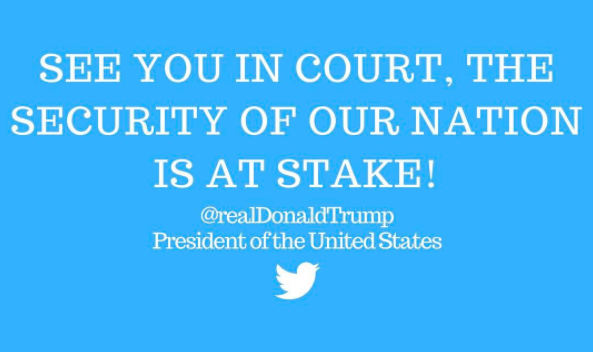How to Read (and How Not to Read) Today’s 9th Circuit Opinion
Today’s 9th Circuit decision is a bit less of a big deal than it will play in the press tomorrow; it will play big both because of the high stakes of the current litigation and because of some rhetorical excess in the opinion itself. The hype is also a function of the fact that had the court issued the stay the government sought, that would have been a very big deal as it would have caused the order to snap back into effect just as suddenly as President Trump loosed it on the world the other day.

Today’s 9th Circuit decision is a bit less of a big deal than it will play in the press tomorrow; it will play big both because of the high stakes of the current litigation and because of some rhetorical excess in the opinion itself. The hype is also a function of the fact that had the court issued the stay the government sought, that would have been a very big deal as it would have caused the order to snap back into effect just as suddenly as President Trump loosed it on the world the other day.
So this stay denial is something of a dog that didn’t bark—but didn’t bark very loudly.
Let’s deal with the moral throat clearing and virtue signaling of the opinion first. Lawyers dream about becoming judges, particularly 9th Circuit judges, to write opinions like this. So phrases about how the President is not above the law, and citations to cases like Endo and Ex Parte Milligan are inevitable, as are the arch and clucking dismissals of presidential demands for deference in national security cases and the intoning of the fact that it’s the job of the judiciary to say what the law is. Ignore all that stuff. It’s exciting. It’s fun to read. It’s a reminder that we live in interesting and dangerous times. But it’s not ultimately what this case turns on.
This case is about two big questions, only one of which the panel’s per curiam today even mentions. The first question is how broad the president’s authority is to limit admissions from the relevant seven countries—and to what extent that authority is limited by constitutional law—under a statute that gives him the sweeping power to do this:
(f) Suspension of entry or imposition of restrictions by President
Whenever the President finds that the entry of any aliens or of any class of aliens into the United States would be detrimental to the interests of the United States, he may by proclamation, and for such period as he shall deem necessary, suspend the entry of all aliens or any class of aliens as immigrants or nonimmigrants, or impose on the entry of aliens any restrictions he may deem to be appropriate.
Remarkably, in the entire opinion, the panel did not bother even to cite this statute, which forms the principal statutory basis for the executive order (see Sections 3(c), 5(c), and 5(d) of the order). That’s a pretty big omission over 29 pages, including several pages devoted to determining the government’s likelihood of success on the merits of the case.
The other question, one the panel does discuss, is the extent to which the repeated and overt invocations of the most invidious motivations on the part of the President himself, his campaign, his adviser, and his Twitter feed will render an otherwise valid exercise of this power invalid. This is what Eric Posner is getting at when he tweets:
Trump's tweets will haunt him for *all* national security actions going forward, interfering even with legitimate gov action pic.twitter.com/5gLKGJQl2l
— Eric Posner (@EricAPosner) February 10, 2017
The Ninth Circuit is correct to leave the TRO in place, in my view, for the simple reason that there is no cause to plunge the country into turmoil again while the courts address the merits of these matters over the next few weeks. Are there tea leaves to read in this opinion? There sure are, particularly with respect to the judges’ analysis of the government’s likelihood of prevailing on the merits and its blithe dismissal of the government’s claims of national security necessity on pages 26-27—a matter on which the per curiam spends only one sentence and one brief footnote.
But it’s worth emphasizing that the grounds on which this order was fought are not the grounds on which the merits fight will happen. Eventually, the court has to confront the clash between a broad delegation of power to the President—a delegation which gives him a lot of authority to do a lot of not-nice stuff to refugees and visa holders—in a context in which judges normally defer to the president, and the incompetent malevolence with which this order was promulgated.




.png?sfvrsn=48e6afb0_5)
